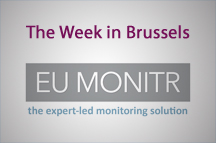 This week the European Parliament followed on the last Council meeting and discussed their priorities ahead of the Rome declaration which will focus on the future of the EU. At their plenary session in Strasbourg, the majority of MEPs stressed the need for member states to set the EU on a course to tackle the immediate needs of citizens.
This week the European Parliament followed on the last Council meeting and discussed their priorities ahead of the Rome declaration which will focus on the future of the EU. At their plenary session in Strasbourg, the majority of MEPs stressed the need for member states to set the EU on a course to tackle the immediate needs of citizens.
This session and the reflections made in the run-up to the 60th Anniversary of the Rome Treaty were the opportunity to make strong statements in support of the Union at a time when it is more fragile than ever. Commission President Jean-Claude Juncker addressed the Turkish attacks on the Netherlands saying they were “totally unacceptable” and that those responsible were moving Turkey away from the EU. This was a move designed to show solidarity for the Dutch government on the day of their election which eventually saw Geert Wilder’s anti-EU and anti-muslim PVV party win 20 out of the 150 seats (a result below expectations which triggered a general sigh of relief in European capitals). Echoing this, speaking in Dutch, Council President Donald Tusk expressed solidarity with the Netherlands, a “place of freedom and democracy”.
 Regarding Brexit, little was made in Brussels of the fact that Theresa May’s bill had cleared all its hurdles in the Houses of Parliament, thus opening the way for the prime minister to trigger article 50. The House of Lords withdrew its amendment demanding guarantees for EU nationals’ rights which is seen as a potential bargaining chip for both sides of the upcoming negotiations but has been denounced strongly by European Parliament Brexit negotiator Guy Verhofstadt.
Regarding Brexit, little was made in Brussels of the fact that Theresa May’s bill had cleared all its hurdles in the Houses of Parliament, thus opening the way for the prime minister to trigger article 50. The House of Lords withdrew its amendment demanding guarantees for EU nationals’ rights which is seen as a potential bargaining chip for both sides of the upcoming negotiations but has been denounced strongly by European Parliament Brexit negotiator Guy Verhofstadt.
On the same day, following SNP First Minister Nicola Sturgeon’s announcement that she would be calling for a new referendum, the European Commission reiterated that Scotland would not be granted automatic access to the EU if it split from the rest of the UK. Thus the saga continues.
Regarding the sectors we focus on - public health and pharma - our IT systems highlighted an upward trend in publications and discussions concerning the areas where the EU can demonstrably add value – i.e. Antimicrobial Resistance (AMR), the price of medicines and Reference Networks (ERNs). Much of this is a continued reaction to one of President Juncker’s five scenarios for The Future of Europe which advocates doing less on public health as well as on social policy and regional development. Commentators such as Nina Renshaw, Secretary General of the European Public Health Alliance (EPHA), were quick to note that “The Future of Europe is not short of such health challenges. Imagine for example, the reality of a ‘post-antibiotic era’ because of our failure to act on drug-resistant infections. Doing less is not a harmless option that only exists on paper. It will cost lives”.
 Another key issue discussed this week was the future of the European Medicines Agency, located in London. EMA’s working parties with patients and healthcare professionals’ organisations met on Wednesday – on the agenda was the implication of Brexit for the agency and its stakeholders. This is after recent reports suggesting that Britain being outside the EMA could lead to patients waiting six to 12 months longer than the rest of Europe to receive newly developed medicines because the UK would be a small market rather than part of a large EU-wide one. The EU, with a population of 500 million, represents 25% of the world’s total drug market. If Britain left the EMA and made its own arrangements to regulate drugs, it would be of much less priority to pharmaceutical firms because it would be as little as 3% of the global market. However, notwithstanding the future relationship between the UK and the EU, the agency will continue its work – indeed, 20 EU countries are seeking to host EMA’s headquarters from the UK once Brexit is complete, along with its 900 staff.
Another key issue discussed this week was the future of the European Medicines Agency, located in London. EMA’s working parties with patients and healthcare professionals’ organisations met on Wednesday – on the agenda was the implication of Brexit for the agency and its stakeholders. This is after recent reports suggesting that Britain being outside the EMA could lead to patients waiting six to 12 months longer than the rest of Europe to receive newly developed medicines because the UK would be a small market rather than part of a large EU-wide one. The EU, with a population of 500 million, represents 25% of the world’s total drug market. If Britain left the EMA and made its own arrangements to regulate drugs, it would be of much less priority to pharmaceutical firms because it would be as little as 3% of the global market. However, notwithstanding the future relationship between the UK and the EU, the agency will continue its work – indeed, 20 EU countries are seeking to host EMA’s headquarters from the UK once Brexit is complete, along with its 900 staff.













